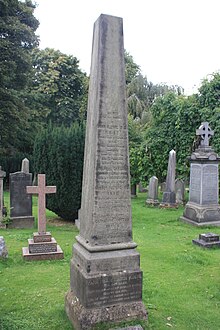|
John Fleming (naturalist)
 John Fleming FRSE FRS FSA (10 January 1785 – 18 November 1857) was a Scottish Free Church minister, naturalist, zoologist and geologist. He named and described several species of mollusc. During his life he tried to reconcile theology with science. Fleming Fjord in Greenland was named after him.[1] LifeFleming was born on Kirkroads Farm near Bathgate in Linlithgowshire, the son of Alexander Fleming and his wife Catherine Nimmo.[2] After studying divinity at the University of Edinburgh he graduated in 1805. He was licensed to preach by the Church of Scotland and ordained as minister of Bressay in the Shetland Islands in 1808. In 1810 he translated to the parish of Flisk in Fife and in 1832 translated to Clackmannan.[3] In 1808, he participated in founding the Wernerian Society, a learned society devoted to the study of natural history. Fleming became a member of the Royal Society of London on 25 February 1813 (he was not granted fellowship). In 1814, he was awarded an honorary doctorate of divinity by the University of St Andrews, and in the same year he became a fellow of the Royal Society of Edinburgh. His proposers for the latter were John Playfair, David Brewster and Robert Jameson.[4] He was awarded the chair of natural philosophy (physics) at the University of Aberdeen's King's College in 1834. In the Disruption of 1843 he left the established Church of Scotland to join the Free Church. In 1845, he became professor of natural history at the Free Church's New College in Edinburgh. He was three times elected president of the Edinburgh Botanical Society (1847–48, 1849–50 and 1856–57).[5] He was then living at 22 Walker Street in Edinburgh's West End.[6] He died at home, Seagrove House in Leith[7] and is buried with his family in the western half of Dean Cemetery in Edinburgh. He is buried with his wife, Melville Christie (1796–1862) and son Andrew Fleming (1821–1901) (also a fellow of the Royal Society of Edinburgh) who rose to be Depute Surgeon General of the Indian Army. CareerFleming was a vitalist who was strongly opposed to materialism. He believed that a 'vital principle' was inherent in the embryo with the capacity of "developing in succession the destined plan of existence."[8] He was a close associate of Robert Edmond Grant, who considered that the same laws of life affected all organisms. In 1824, Fleming became involved in a famous controversy with the geologist William Buckland about the nature of the flood as described in the Bible. In 1828, he published his History of British Animals. This book addressed both extant and fossil species. It explained the presence of fossils by climate change, suggesting that extinct species would have survived if weather conditions had been favorable. These theories contributed to the advancement of biogeography and exerted some influence on Charles Darwin. Flemings' comments on instinct in his book Philosophy of Zoology had influenced Darwin.[9] In 1831, Fleming found some fossils which he recognized as fish in the Old Red Sandstone units at Fife. This did not fit the generally accepted notion that the Earth was approximately 6,000 years old. Works
Described taxaSpecies in the phylum Mollusca described by Fleming:
References
External links
|
Portal di Ensiklopedia Dunia